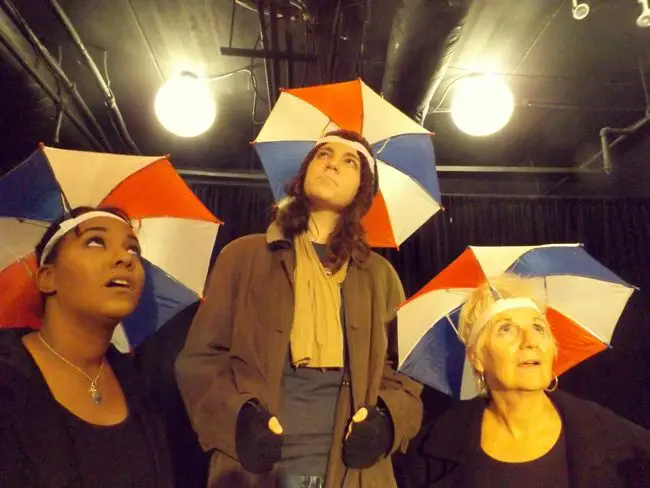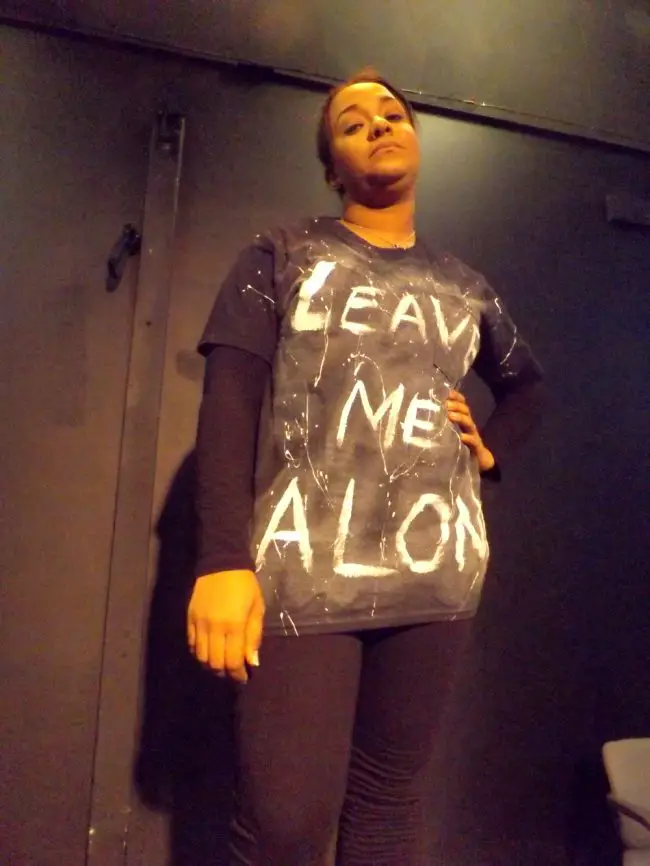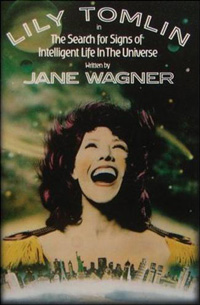
Make America great again? It never was so great for some people. A woman president? A woman would never make a good president.
So say characters in the latest production by City Repertory Theatre.
No, the Palm Coast troupe isn’t staging some quicky play concocted and rushed into production since the election of Donald Trump as president.
Rather, City Rep is staging “The Search for Signs of Intelligent Life in the Universe,” the one-woman stage show written by Jane Wagner and starring Lily Tomlin. The play debuted on Broadway in 1985 and won the Drama Desk Award for Unique Theatrical Experience, and it landed Tomlin a Tony Award for Best Actress in a Play.
Asked how relevant “Search” is today, and the three members of the City Rep cast present at a recent rehearsal responded in unison like some Greek chorus: “So relevant!” (Yes, the troupe has divvied up the play’s multiple roles among five actresses.)
“There are so many parallels that can be drawn from what was happening then – the women’s rights movement, the ERA and all that happening in the 70s — and now,” said Jill Cicalese, the young, recent Flagler College grad who portrays the play’s most iconic character: Trudy the bag lady, who claims to be earth’s emissary to visiting extraterrestrials. Cicalese also plays Lyn, one of the show’s feminists. (ERA stands for the Equal Rights Amendment, the constitutional proposal that fell short by a hair thanks, mostly, to Florida, which could have mnade it happen, but opted not to.)
“It’s not like nothing’s changed, but we’re still fighting,” Cicalese said. “It’s a little less radical today, I think. But there’s a line that Lyn says as she’s fighting with her suppressive boyfriend — he lets it slip that a woman would never make a good president. The first time I read that, it was right after the election and my heart just dropped into my stomach.”

“My favorite line in Agnus’ spoken word is ‘I must have missed out on all those things that made America so great,’ ” Rose said. “The first night I said it, I was like ‘Wow, I feel like I’m going to upset somebody in the audience, but I don’t mind.’ ”
“These women are still here,” said Kathryn Weed, who portrays the prostitute Brandy, the self-improvement-obsessed Chrissy and the consumer advocate/Tupperware hawker Judith Beasley. “Brandy is out on the street. She’s just as tough, just as smart streetwise as ever. There’s a back story to Chrissy where she had contemplated suicide and had written a note and everything. There are people just like Chrissy who just do not see themselves in a positive light, who have been dismissed most of their life and are struggling to hang on. I know people like that.
“As far as the Tupperware lady, there’s always going to be somebody talking about sex,” Weed added with a laugh.
Seeking to clarify just the sort of “Tupperware” that Judith is championing, City Rep director John Sbordone chuckled and whirled in: “She’s peddling dildoes.”
Other characters include Kate, a “profoundly wealthy woman suffering from affluenza,” played by Anne Kraft, and another feminist named Marge, played by Caitlin Eriser.

In an interview with me before a solo performance in 2014 in Daytona Beach, Tomlin (who had just married Wagner, her longtime partner and sometime co-creator) said Trudy, Judith Beasley and her characters from other plays and her TV work (Ernestine the telephone operator, the little girl Edith Ann, etc.) are “all sort of like me.”
Tomlin said she wants her performances “to be entertaining and funny and connecting and validating — validating us as a species, no matter how bad we are, how rotten and wart-covered . . . My parents are Southern and I was born in Detroit’s inner city. I lived with so many different kinds of people all through my childhood. So I came to know that no matter how differently everyone appears, they’re not so different.”
That may be difficult to fathom with Trudy, whom Tomlin’s website describes as “a former ad exec turned homeless observer in communication with extraterrestrials who are trying to understand the human condition.”
Yet despite Trudy’s unkempt appearance, her shopping cart full of treasured garbage, her wild darting eyes, the umbrella hat she wears to channel aliens and her bizarro proclamations, she long ago became the play’s most recognizable – and most lovable and relatable – character.
“You people look at my shopping bags and call me crazy ’cause I collect this junk,” Trudy says. “What should we call the ones who buy it?”
And says Trudy: “I refuse to be intimidated by reality anymore. After all, what is reality anyway? Nothin’ but a collective hunch.”
And: “Reality is the leading cause of stress among those in touch with it.”
Trudy’s appeal may lie in what author and Buddhist Wes “Scoop” Nisker calls “crazy wisdom.” In his 1990 book of that title, Nisker places Trudy in heady company with many other sages: “Crazy wisdom is the wisdom of the saint, the Zen master, the poet, the mad scientist and the fool. Crazy wisdom sees that we live in a world of many illusions, that the emperor has no clothes, and that much of human belief and behavior is ritualized nonsense. Crazy wisdom loves paradox and puns and pie fights and laughing at politicians.
“You will find crazy wisdom flowing through all of human history . . . pointing out different ways of looking at things and providing a necessary counterpoint to self-righteousness. From the Taoists to the Dadaists; from the Book of Ecclesiastes to Mark Twain’s ‘Letters to the Earth,’ in the parables of Chuang-Tzu and the Baal Shem Tov, out of the cyclonic whirl of Rumi’s dervish poetry and the profound nonsense of Samuel Beckett’s confused characters, lurking beneath the unruly hair of Albert Einstein and between the bushy eyebrows of Groucho Marx, inside the howly voice of Allen Ginsberg and the crazed rantings of Lily Tomlin’s bag lady . . . crazy wisdom is the skeptical voice inside us that doubts our importance in the world and questions our belief in a higher purpose. It is the nagging suspicion that both our reasons and our reasoning are mistaken.
“Crazy wisdom laughs at our ridiculous ways and shows compassion for the suffering that results from them.”
Cicalese said Trudy “actually is my favorite character, but I didn’t think she was going to be when I first started reading her monologues. I had never played a role like her before. I wasn’t sure I was going to be able to embody her. But I’m having fun with her because she’s so different. She’s got it all figured out – but she doesn’t. She has a perspective on life that ‘Yeah, I’m crazy – so what?’
“She has this wonderful line: ‘Going crazy was the best thing that ever happened to me.’ Then a little later she says, ‘The human mind is like a piñata – when it cracks open you’ve got a bunch of surprises inside. Once you get that perspective on life, you can see that losing your mind is a peak experience.’ That’s probably one of my favorite quotes and it’s in the opening monologue.”
“There’s a clarity in Jane Wagner’s writing, a perception of insight into who we are and how we handle, for instance, the women’s movement, those kind of momentous episodes in our history,” Sbordone said. “This play is just a wonderful, witty, insightful evening in theater. It is the kind of show that CRT should be doing, needs to be doing.”
— Rick de Yampert for FlaglerLive
![]()
“The Search for Signs of Intelligent Life in the Universe,” directed by John Sbordone, at 7:30 p.m. Thursday Dec. 8 through Saturday Dec. 10, and at 2 p.m. Sunday Dec. 11 in City Marketplace, 160 Cypress Point Parkway, Suite 207B, Palm Coast. Tickets are $20 adults and $15 students, available by calling 386-585-9415 or booked easily online here.






























Leave a Reply